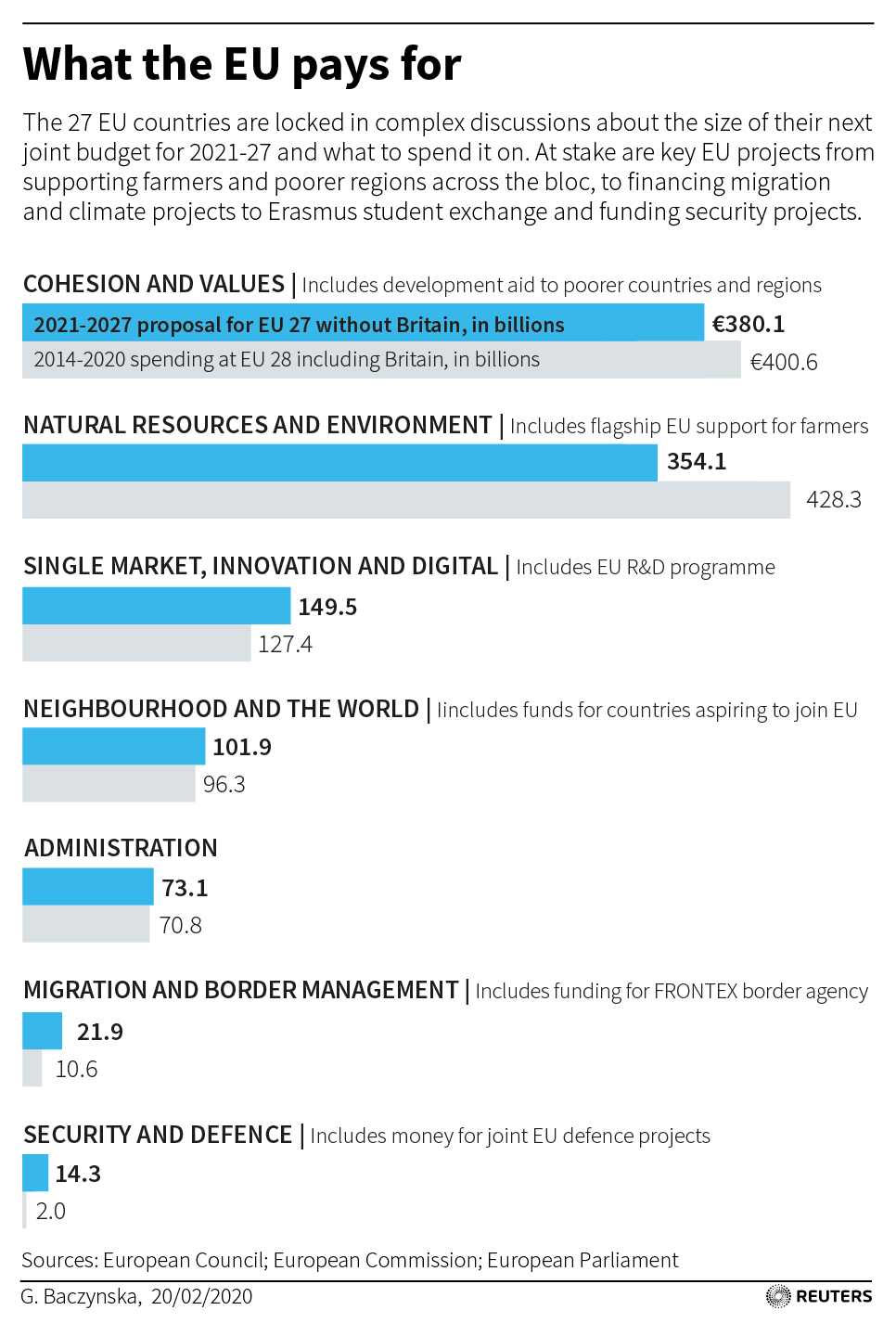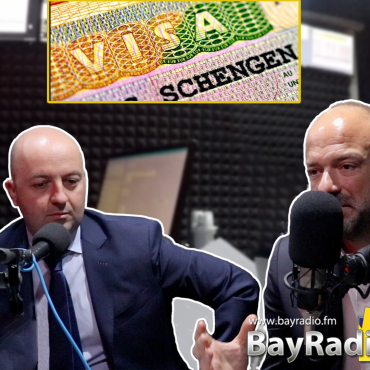-
 play_arrow
play_arrow
BayRadio Listen Live Broadcasting in Spain
Summit standoff as EU leaders grapple with Brexit-sized hole in budget


EU leaders made no headway on Thursday in fractious talks on a joint 2021-27 budget that was left with a 75 billion euro (62.9 billion pounds) hole after Britain’s departure at a time when they face costly new challenges from climate change to migration.
The joint budget is the most tangible expression of the European Union’s priorities over the next seven years – and its member states’ willingness to stump up cash for them – but divisions were evident even before the talks began in Brussels.
The 27-member bloc wants to spend more on climate, migration, digitalisation and security but richer net contributors to the budget refuse to pay more, and beneficiaries want to retain the support they receive for farming and development.
Britain, which left the EU last month, was the second-biggest net contributor to the budget after Germany.
“I hope that we make sizeable progress… It’s a complicated task and certainly big differences have to be overcome,” German Chancellor Angela Merkel said as she went into the summit.
The starting point for discussions on the size of the budget is 1.074% of the bloc’s gross national income (GNI) or 1.09 trillion euros.
While only a fraction of member states’ national budgets, it is still seen as far too much by some and far too little by others, and diplomats said it is unlikely that the gap between them can be closed over two days of talks.
“It would be unacceptable to have a Europe that compensates for the departure of the British by reducing its own means,” French President Emmanuel Macron said. “I will take the time needed to reach an ambitious agreement. This could take several hours, several nights, several days.”
There was no drama on the first day of the summit.
The leaders laid out their known positions one by one and then the summit chair, European Council President Charles Michel, held meetings with each one into the night to come up with a new starting point for negotiations on Friday morning.
The battle over the size and priorities of the long-term budget exposes rifts within the EU, between countries in the north and south, between east and west, and between more developed and less advanced economies.

NEW SPENDING PRIORITIES
Dutch Prime Minister Mark Rutte, whose country is one of four net contributors that want to limit the overall size of the budget to 1.0% of GNI, said he could not sign up to a budget that allocates one-third for “cohesion funds” to develop poorer regions and another third on support for farmers.
Agriculture accounts for around 1% of the EU’s economy.
“I cannot sign up to this proposal. The proposal is simply not good,” Rutte told reporters ahead of the talks.
To emphasise that his position is final, Rutte said he had brought along a biography of composer Frederic Chopin that he planned to read at the summit as he had nothing to negotiate.
Those who want to preserve the status quo were equally adamant.
“New areas of spending, like research or migration, defence or innovation are important policy areas, but they cannot be at the expense of cohesion and the common agriculture policy,” said Polish Prime Minister Mateusz Morawiecki.
France, now the number two contributor, wants to safeguard subsidies for farmers but is uneasy about the fiscal impact of a larger budget sought by the so-called “Friends of Cohesion”.
Diplomats said Berlin is irked that under Michel’s first budget proposal it would end up being considerably worse-off compared with 2014-20, while Paris could see some gains.
The EU budget gets money from customs duties on goods entering its single market, a cut of sales tax, antitrust fines imposed by the EU on companies, and from national contributions.
It spends money on subsidies for EU farmers, on equalising living standards across the bloc, border management, research, security and various foreign aid programmes.
The Netherlands, Austria, Sweden and Denmark want to limit the budget to 1.00% of GNI. Germany, the biggest contributor, is prepared to accept a bit more, but 1.07% is too high for Berlin.
The European Commission, the bloc’s executive arm, wants 1.1% and the European Parliament pushes for 1.3%.
To help fill the Brexit gap, the Commission has also proposed scrapping rebates on budget contributions that many of the net payers now enjoy. But the net payers refuse to accept an end to the rebates.
The bloc is also looking for new sources of revenue, but the leaders are split on a proposed tax on plastic waste or sharing profits from carbon emissions trade.
Officials warn that without a deal by the end of the year, the bloc will have to freeze most of its projects from 2021.
Written by: BayRadio News
Similar posts
Recent Posts

Ctra. Cabo La Nao, CC La Nao, Local 6 03730 Javea, Alicante, Spain
Advertise with us
Do you have a business in Spain? Do you provide a service to the expat community in Spain? Would you like your message to reach over 500.000 people on a weekly basis?
BayRadio is a community orientated radio station offering fantastic content to our many listeners and followers across our various platforms. Contact us now and find out what Bay can do for you!
Our business is helping your business grow.
BAY RADIO S.L. © 2024. ALL RIGHTS RESERVED. WEB DESIGN BY MEDIANIC






